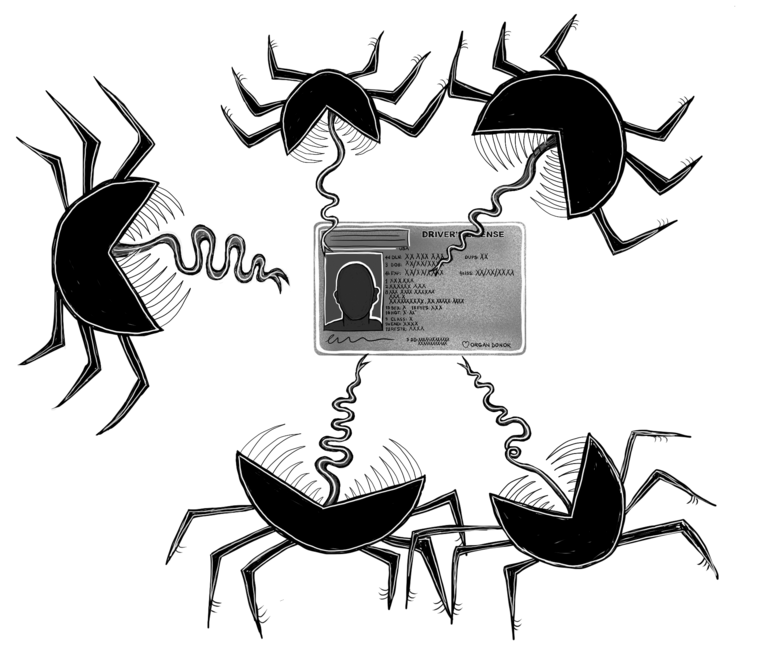State DMV databases

State departments of motor vehicles (DMVs) are a key source of surveillance data for law enforcement, commercial data aggregators, and others who can access it. Since at least 2004, the Department of Homeland Security turned to DMV data for up-to-date addresses of migrants and has relied heavily on it since.Footnote 1 DHS access to DMV records exponentially expands the data criminalization dragnet by allowing immigration enforcement to trawl the photos and sensitive information of hundreds of millions of people — migrants and non-migrants alike — whose information are not found in criminal record databases because they have never been arrested or convicted of anything.
Increased identity securitization technologies, facial recognition software, and automated, interoperable data systems have effectively turned state DMVs into biometrics brokers for multiple DHS agencies and other law enforcement. Georgetown Law Center on Privacy & Technology found that ICE has the driver's license data for 74 percent of adults in the US. ICE has scanned the driver’s license photos of one in three adults and used facial recognition technology to search through those photos.Footnote 2
This systematic violation is legal. Despite past attempts to restrict and regulate DMV sharing and sale of personal data following a series of high-profile murders in the 1980s and 1990s where stalkers were able to locate their victims via DMV records, a number of loopholes remain. Carve-outs for “legitimate government agency functions,” “legitimate business needs in transactions initiated by the individual to verify accuracy of personal information,” and others allow DMVs to continue to sell, for tens of millions of dollars, individuals’ names, dates of birth, addresses, vehicles, and email addresses to private investigators, credit bureaus like Experian, and data aggregators like LexisNexis.Footnote 3 Footnote 4
DHS has been able to access DMV data in multiple ways. It can buy this data, which is often sold by DMVs in bulk to research corporations such as LexisNexis or Thomson Reuters — both of whom ICE has had contracts. (Until April 2021, ICE used Thomson Reuters’ data system, Consolidated Lead Evaluation and Reporting, or CLEAR, to track, arrest, and deport migrants in the US. Among other data points, CLEAR included utility records and automated license plate reader information that provided home addresses and real-time location data of vehicles.Footnote 5 After backlash against the company by its shareholders, Thomson Reuters announced that it would conduct a “company-wide human rights impact assessment of [its] . . . products and services.”Footnote 6 ICE now relies on LexisNexis’ Accurint for similar services.Footnote 7 )
In these massive private databases, available via subscription to law enforcement and others, these corporations compile information from private and public databases on individuals, including DMV records like car registration, license plate scans, and insurance information.Footnote 8 These data are cross-referenced by corporations like LexisNexus and Thomson Reuters with information scraped from social media, emails, cell phone location data, utility bills, financial information, arrest records, employment records, and more to create detailed profiles of individuals.Footnote 9
Additionally, DHS cultivates a close relationship with the American Association of Motor Vehicle Administrators’ (AAMVA) — a privately-run, non-profit organization that caters to law enforcement.Footnote 10 AAMVA’s State Pointer Exchange Services (SPEXS) database allows states to share Social Security and other information that can be misused for immigration enforcement. Some states have collected this information since the passage of the REAL ID Act in 2005.Footnote 11
ICE, CBP and Citizenship and Immigation Services (CIS) also receive DMV information from Nlets, another private nonprofit corporation run by states for law enforcement data-sharing.Footnote 12 In December 2019, in order to boost the state’s economy,Footnote 13 New York passed the Green Light law, which changed DMV data collection requirements for driver’s licenses in order to allow anyone, regarding of immigration status, to apply for a license.Footnote 14 Notably, the legislation also blocked ICE and CBP from accessing NYDMV driver’s license and vehicle registration data via Nlets.Footnote 15 This information, which had previously been available via Nlets, includes traffic-related offenses, including misdemeanors, which may not show up in other criminal records datasets.Footnote 16 ICE and CBP were now required to obtain a subpoena, court order or judicial warrant in order to access DMV records for civil immigration cases.Footnote 17 Additionally, the DMV is supposed to notify the person at the center of a federal agency's inquiry within three days.Footnote 18 In court testimony following the change, then-Acting Secretary of DHS, Chad Wolf, stated that DMV data had been “critical” for ICE to “identify criminal networks, create new leads for investigation, and compile photographic line-ups.”Footnote 19 It is unclear whether ICE, CBP and CIS have found workarounds in New York state to access NYDMV data.
Data-sharing practices between Departments of Motor Vehicles and ICE are flashpoints where the inconsistencies of immigration policies — which exist on a continuum ranging from bureaucratic case management to carceral punishment and banishment — play out. Sixteen states and Washington, D.C., issue driver’s licenses to people who don’t have US Social Security numbers but can provide official identification from other countries, and proof of state residency.Footnote 20
Yet in Vermont (a state that issues such licenses) individual DMV workers forwarded copies of birth certificates, passports and license applications directly to ICE agents.Footnote 21
In Illinois — another state that runs a similar driver’s license program — the Illinois Secretary of State (which runs the state DMV) contacted ICE’s Law Enforcement Support Center in 2014 to coordinate the arrest of a man at his scheduled appointment for a Temporary Visitor Driver’s License. He had been served a deportation order in 2000 and was convicted of a DUI charge in 2005.Footnote 22
In New York, back in 2012, an ICE agent sought a batch list from the Albany DMV of all the recipients of Temporary Visa Restricted licenses “issued 1-3 years ago,” “in order to identify deportable aliens.”Footnote 23

